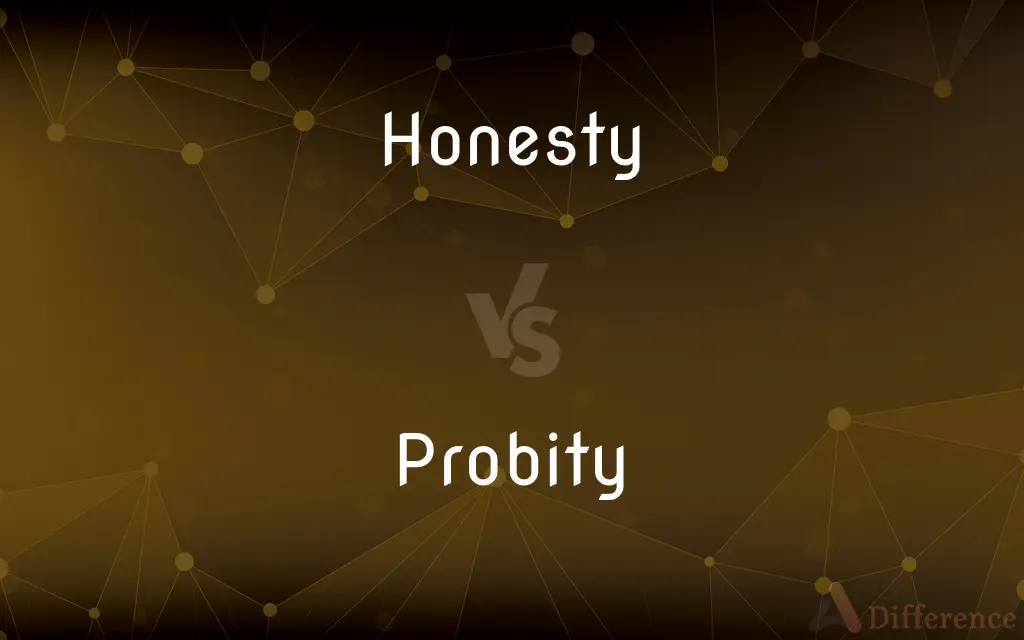Honesty vs. Probity — What's the Difference?
By Maham Liaqat & Fiza Rafique — Updated on April 15, 2024
Honesty involves truthfulness and transparency in actions and words, whereas probity specifically emphasizes integrity and uprightness in professional or public roles.

Difference Between Honesty and Probity
Table of Contents
ADVERTISEMENT
Key Differences
Honesty is generally understood as the quality of being truthful, open, and sincere in one’s dealings and communications. On the other hand, probity is often associated with moral integrity, especially in public and professional contexts, highlighting adherence to ethical standards and avoidance of corruption or dishonest behaviors.
While honesty can apply to any personal interaction or self-expression, ensuring authenticity and straightforwardness, probity extends specifically to ethical conduct in official duties and professional responsibilities, suggesting a higher standard of ethical behavior. Whereas honesty is valued in everyday personal relationships, probity is crucial in roles where trust and ethical governance are paramount.
Honesty is celebrated as a virtue in social interactions, where individuals are expected to present the truth and avoid deception. Probity, on the other hand, is a requisite quality in professional realms, such as judiciary, administration, or business, where ethical standards govern actions and decisions.
In terms of cultivation, honesty is often taught from an early age as a fundamental moral value, encouraging individuals to avoid lying and to be genuine. Conversely, probity is cultivated through professional training and ethical education, focusing on uprightness and adherence to strict codes of conduct in specific contexts.
Comparison Chart
Definition
Quality of being truthful and transparent
Adherence to strong moral principles in professional roles
ADVERTISEMENT
Context
Applies in all personal and informal interactions
Mostly relevant in professional and public contexts
Primary Importance
Essential for personal relationships and self-integrity
Critical for maintaining public and professional trust
Education
Taught as a basic life virtue
Often associated with professional ethics training
Key Characteristic
Sincerity in expressions and actions
Moral uprightness and ethical governance
Compare with Definitions
Honesty
The quality of being honest.
Honesty compelled her to admit her mistake.
Probity
Integrity and decency in professional conduct.
Probity in public office is essential for democracy.
Honesty
Sincerity in behavior and attitude.
Her honesty in dealing with clients won her respect.
Probity
Moral excellence in professional responsibilities.
She was known for her probity and dedication.
Honesty
Truthfulness in statements and actions.
Honesty is expected in all academic work.
Probity
The quality of having strong moral principles.
The judge's probity was respected by all.
Honesty
Openness and straightforwardness.
Their honesty about the situation cleared all misunderstandings.
Probity
Uprightness and ethical behavior.
His probity in financial dealings reassured investors.
Honesty
Free of deceit and untruthfulness.
He valued honesty above all else.
Probity
Adherence to ethics and honesty in governance.
The new policies were introduced to ensure probity.
Honesty
Honesty is a facet of moral character that connotes positive and virtuous attributes such as integrity, truthfulness, straightforwardness, including straightforwardness of conduct, along with the absence of lying, cheating, theft, etc. Honesty also involves being trustworthy, loyal, fair, and sincere.
Probity
Complete and confirmed integrity; uprightness
"He was a gentlemanly Georgian, a person of early American probity" (Mary McGrory).
Honesty
The quality or condition of being honest; integrity.
Probity
Integrity, especially of the quality of having strong moral principles; decency and honesty.
Honesty
Truthfulness; sincerity
In all honesty.
Probity
Tried virtue or integrity; approved moral excellence; honesty; rectitude; uprightness.
Honesty
(Archaic) Chastity.
Probity
Complete and confirmed integrity
Honesty
(Botany) A Eurasian plant (Lunaria annua) in the mustard family, cultivated for its fragrant purplish flowers and round, flat, papery, translucent, silver-white seedpods. Also called money plant, satin flower.
Honesty
The act, quality, or condition of being honest.
Academic / artistic / emotional / intellectual honesty
Brutal / devastating / searing honesty
Honesty
Honor; decency, propriety.
Honesty
Chastity.
Honesty
(countable) Any of various crucifers in the genus Lunaria, several of which are grown as ornamentals, particularly Lunaria annua.
Honesty
Honor; honorableness; dignity; propriety; suitableness; decency.
She derives her honesty and achieves her goodness.
Honesty
The quality or state of being honest; probity; fairness and straightforwardness of conduct, speech, etc.; integrity; sincerity; truthfulness; freedom from fraud or guile.
That we may lead a quiet and peaceable life in all godliness and honesty.
Honesty
Chastity; modesty.
To lay . . . siege to the honesty of this Ford's wife.
Honesty
Satin flower; the name of two cruciferous herbs having large flat pods, the round shining partitions of which are more beautiful than the blossom; - called also lunary and moonwort. Lunaria biennis is common honesty; Lunaria rediva is perennial honesty.
Honesty
The quality of being honest
Honesty
Southeastern European plant cultivated for its fragrant purplish flowers and round flat papery silver-white seedpods that are used for indoor decoration
Common Curiosities
Why is probity important in professional settings?
Probity ensures ethical conduct, maintaining trust and integrity essential for professional and public trust.
How is honesty taught?
Honesty is often instilled through familial and societal values from an early age, emphasizing the importance of truthfulness and sincerity.
What is the main difference between honesty and probity?
Honesty refers to truthfulness in personal interactions, while probity is about ethical integrity in professional or public roles.
Can a person be honest but lack probity?
Yes, a person can be generally honest in personal dealings but might lack the ethical standards required for probity in professional contexts.
What roles require a high level of probity?
Roles in government, judiciary, administration, and any position of trust require a high level of probity.
Are honesty and probity mutually exclusive?
No, they complement each other; probity builds on the foundational values of honesty but applies them in more regulated environments.
Is probity only relevant to public officials?
While especially important for public officials, probity is also crucial in private sector roles involving trust and ethical decisions.
How do children learn about probity?
Children learn about probity as they are educated about societal rules and the importance of ethics in certain roles.
How do cultures differ in their appreciation of honesty and probity?
Cultural values influence the emphasis on honesty and probity, with some cultures placing a higher premium on community trust and ethical governance.
Can honesty be problematic sometimes?
Excessive honesty without tact can sometimes lead to hurtful or harmful situations.
Share Your Discovery

Previous Comparison
Repeat vs. Reiterate
Next Comparison
Kip vs. NapAuthor Spotlight
Written by
Maham LiaqatCo-written by
Fiza RafiqueFiza Rafique is a skilled content writer at AskDifference.com, where she meticulously refines and enhances written pieces. Drawing from her vast editorial expertise, Fiza ensures clarity, accuracy, and precision in every article. Passionate about language, she continually seeks to elevate the quality of content for readers worldwide.
















































